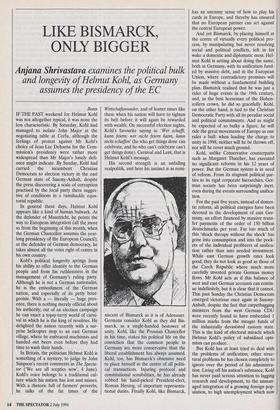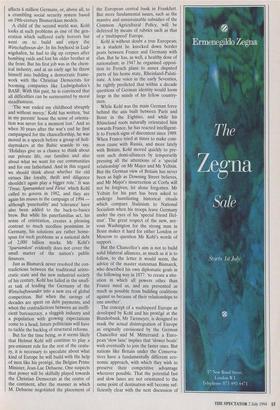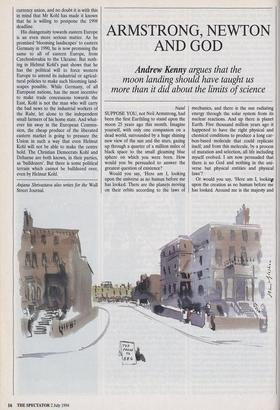The programme to put a man on the moon has
been called a silly stunt by a silly president in a silly decade. Well, it is true that President Kennedy was rather a silly president and the 1960s were a distinctly silly decade (what else would you expect from the most sheltered and privileged generation of young adults in history?), but the landing on the moon was a won- derful thing. It was one of mankind's great works, It should be compared with an extravagant but noble work of art — and throughout the ages many of these have had unworthy sponsors with unworthy motives. It was never a very useful project in that it would lead to practical advances, and the fact that the space programme petered out after the moon landing was quite predictable.
Kennedy commissioned the Apollo pro- gramme to impress the American public with a feat that would better the Russians. It had some useful by-products, such as Teflon, but they were of unconvincing worth for the money spent. (I must say, however, that we use Teflon throughout the chemical plant of the factory where I work and it has marvellous and unique abilities to resist chemical attack.) Once the landing on the moon was accom- plished, no further prodigies followed, and the reason is simple: space is too big. On a scale where the distance from the Earth to the moon is one inch, the average distance to Mars, the nearest planet on which we could land, is 14 yards and to the nearest star (apart from the sun) 2,000 miles. We are stuck in this corner of our galaxy for a long time, perhaps forever.
In 1969, when Neil Armstrong's rocket took off for the moon, I was a science stu- dent at the University of Cape Town. South Africa then did not have television (because the government, quite accurately, believed it would corrupt the public against the ideals of apartheid). My father and I listened to the landing on a crackly radio. The landing craft separated from the orbiting craft and began the descent. American voices told that the closing dis- tance to the moon was ten miles, one mile, a football field, a double-storey building, `So which one has the most expensive words?' tem for describing the physical world. It is nothing more. It does not make moral judgments nor give moral instruction; it brings no messages of comfort; it does not explain the meaning of existence; it has no bearing whatsoever on religion. Newton himself had peculiar religious ideas but he kept them separate from his science.
Scientific knowledge is based entirely on repeatable experiments, observation, pre- diction and logical consistency. Religious knowledge is based entirely on revelation by the prophets transmitted to all men through scripture. Both are too hard for modern man. He shrinks before their disci- pline and before their uncompromising conclusions.
On the one hand, modern man does not want the labour of mathematical training necessary for scientific understanding, and he finds the reductionist theories of science bleak or even frightening. On the other, he cannot face the trial of prayer and contem- plation necessary for religious understand- ing, he flinches before the harsh moral injunctions of the prophets and he feels embarrassed about the miracles in the Bible. What he wants is to combine science and religion into an effortless and immedi- ate system of comfort and meaning. There are quacks and ideologues only too willing to oblige him.
If you go into any popular bookshop today, you will find a tiny selection of sci-
THOMAS PINK JERMVN ST LONDON
SHIRT SALE
Thomas Pink
From Monday, 4th July Men's and ladies' shirts
35 Dover St, W1 16 Blomfield St, EC2 16 Cullum St, EC3 82 Chancery Lane, WC2 Drayton Gardens, SW 10 Selfridges, Oxford St, WI 32 Castle St, Edinburgh
All branches except Jermyn St, Heathrow Airport (Terminals 1.0 Tar Free) and Mail Order.
For enquiries, please telephone 071.498 2202
VISITING Warsaw these days can be a surprising experience. Along streets where once there were empty state shops, now there are full private shops; in the building where the Communist Party once held its plenary sessions, now there are meetings of the booming stock exchange; on bedside tables, where thoughtful Poles once had Moscow News, or perhaps out-of-date copies of Newsweek (smuggled in by the American Embassy), now they have The Spectator.
And not only in Warsaw. From Bucharest, a subscriber writes in that he has been 'a permanent reader of your most interesting articles even when I did not share the opinion of those articles — or, rather, when I strongly disapproved of them'. From Odessa, another subscriber writes that 'your magazine is the only intel- ligent publication available not only for me but also for other people'. Each one of his issues was shared with the English Speak- ing Literary Club of Odessa, he explained, while back issues are now stored in the information department of a newly estab- lished independent radio station in Odessa, Radio GLAS. A local politician from Bydgoszcz in western Poland reports that he saves The Spectator to read on his frequent train journeys, because it 'takes my mind off of our pessimistic politics and makes me think about the outside world'.
It was 1988 when we first attempted to relieve the pessimism in Eastern Europe and bring in the outside world, by launch- ing a campaign to send half-price subscrip- tions of The Spectator to Poland. Later, as
Address PAYMENT OPTIONS: (Equivalent US$ and Eurocheques accepted) 0 I enclose my cheque/money order made payable to The Spectator for £/$ ❑ Please charge my credit card for Please tick: VISA ❑ ACCESS ❑ DINERS CLUB ❑
EUROPE
walls fell and magazine delivery grew more reliable, we broadened the campaign to include Czechoslovakia, Hungary, Rumania and the ex-Soviet Union. Since then, thousands of copies of The Spectator, donated by our unusually generous and far-sighted readers, have flowed from London to Warsaw, Bucharest, Odessa and even Samara on the Volga, the home of a particularly fervent fan.
Oddly enough, The Spectator is probably appreciated far more now in these coun- tries than it was during the early years of the transformation away from commu- nism, when people still felt optimistic and confident about political change. In the last two years, with their institutions reel- ing from the shock of transformation, with the public fear of economic change growing, many people who support democracy and capitalism have begun to doubt themselves; politicians advocating a return to the good old communist days have begun returning to power.
Despite economic change — and some- times because of it — western magazines are prohibitively expensive in Eastern Europe. A subscription to The Spectator could cost a Rumanian professor more than a quarter of his annual wage; it would bankrupt a Russian with a family- to sup- port. But this is not the time for the West to desert its friends in the East, and not the moment to cut off the flow of western ideas and information. After all, these are countries where gifts of ideas and informa- tion are far more important than gifts of money: stable democracy does not require
GIFT SUBSCRIPTIONS FOR EASTERN EUROPE .... Suffer little children
Sir: Martyn Harris (Tittle horrors through the ages', 25 June) is quite wrong to say that childhood in an age of faith was 'a dustbin for adult sins'. There is a tradition in Christendom of childhood innocence that goes back a long way. Take, for exam- ple, the words of Jesus Christ: 'Believe me, unless you become as little children again, you shall not enter the kingdom of heaven.' (Matthew xviii, 3) and: 'Let the children be, do not keep them back from me; the king- dom of heaven belongs to such as these.' (Matthew xviiii, 14).
Then there is the question of baptism. The Catholic Church taught that baptism involved the washing away of original sin. Thus, if it took place in infancy, which was almost invariably the case, the child was innocent until the age of reason (about seven), after which sins could be absolved in sacramental confession. The idea of the child as 'a limb of Satan' who needed the devil driving out with a rod obviously derives from those Protestant sects which rejected the doctrine of bap- tismal regeneration (and sacramental confession).




























































 Previous page
Previous page